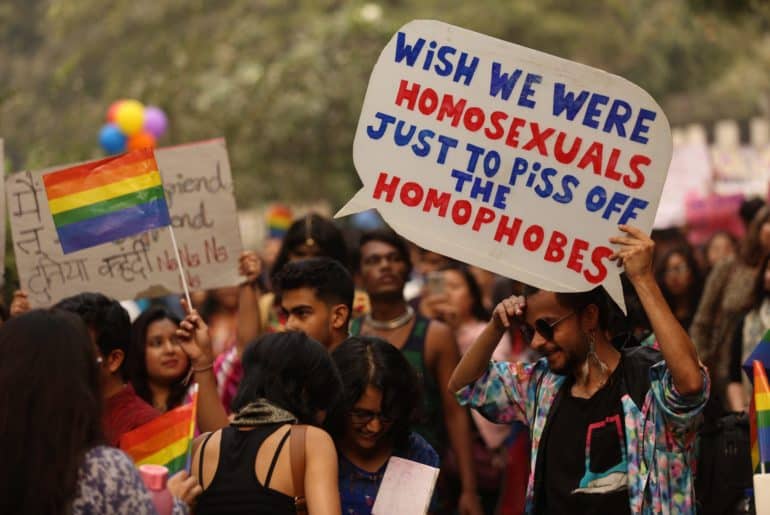“Parade of Power, Pride and Resistance- March for Progressive and Inclusive Campuses” read the poster of the pride parade organised by Students’ Federation of India (SFI). However, the march was met with strong opposition from members of the queer community, who accused SFI of queer baiting and alleged that the parade was nothing more than tokenism.
On June 1, 2023, the North Campus of Delhi University was engulfed in the colours of the pride flag. Hundreds of marching feet echoed across campus as the Student Federation of India (SFI) organised a pride parade to celebrate and support the LGBTQIAP+ community. Horizontal reservations for transgender students, GSCASH implementation, gender-neutral washrooms, queer-inclusive mental health cells, and anti-ragging cells were among some of the top demands of this year’s pride parade.
However, the parade drew strong criticism not only from queerphobes but also from members of the community who accused SFI of queer baiting. Many queer student activists and members of queer collectives and gender cells across Delhi alleged that the pride march is nothing more than SFI’s tokenistic attitude. The SFI’s ignorance or inaction on queer matters throughout the year created a solid foundation for these allegations. Many queer activists and students chose not to participate in the parade. This caused a heated debate within the community.
If not SFI then who? The majority of student unions have historically neglected queer issues, and this continues to be the case today. Whether it is NSUI, ABVP, or AISA. SFI is the only student organisation that talks about queer rights and organises pride parades on campus that are attended by hundreds of people and stands out for queer rights. It’s still better than doing nothing even if they are only doing it for political reasons.
-Prakhar Gangwar (He/They)
Some people in the community, however, believe that building a new room is better than making concessions or attempting to fit into a certain space.
Most political parties or student unions don’t care about queer issues. They talk about rights when doing so serves their political objectives. Abolishing such places sends a loud and clear message that queer lives are not a commodity to be exchanged for votes. Resisting tokenistic behaviours will likely lead to a successful organisation that cares about queer rights.
-Astha Bansal (She/Her)
But in a country like India, where everything revolves around politics, Is this really a good option?
You can’t abolish such spaces. Majority of the country is still unaware about the queer community. It is only cities like Delhi, Mumbai or other metropolitan cities which give you freedom and a chance to organise and attend queer events like pride parades where you get to meet people from the community and freely express yourself.
-Pravishti (She/ Her)
The conversation on whether the pride parade was just a bait or not became pertinent after a few people who attended the parade posted about their experiences on social media.
It appeared to be an SFI political rally. The number of SFI flags heavily outnumbered the number of pride flags.
-Anonymous (She/They)
It was not an apolitical pride parade. A political party organised a political pride parade. So, of course, we’ll have our flags. I identify as queer. I would not have stayed here if SFI uses pride parade as a queerbaiting tool. As a queer student, I say that SFI supports us, and I say this as the president of Indradhanush: The queer affirmative of ZHDC (Morning), not as a representative of SFI. If SFI stops to be the support system, the QC won’t last a single day.
-Arnab Adhikari (He/Him), SFI Member & President of Indradhanush
According to Arnab, the absence of effective social media management has resulted in this debate.
We aren’t handling social media properly. We don’t talk much about the work we do on social media. We all realised that we must communicate, we must post more to avoid such misunderstandings.
-Arnab Adhikari (He/Him)
Pride month always brings discussions around queer baiting into the limelight. Pride month, when it comes to queerbaiting gets reduced to nothing more than a celebration of the unfair privilege enjoyed by the dominant segment of the queer community. The privileged section of the community, largely cis-gay men who dominate most queer spaces, is at the top, while the transgender community is at the bottom. To fully understand this, we must first acknowledge that hierarchy and dominance are inevitable, and, consequently, this cycle of dominance also exists within the queer community. Cis-gay men dominate most queer spaces, tokenistic behaviour by political parties or corporations has little influence on them, and they continue to feed corporate tokenism and empty politics and benefit from it at the same time.
Read Also: Pride and Privilege: An unequal scale
Featured Image Credits: Instagram Page- DU Beat and SFI Delhi
Dhruv Bhati














